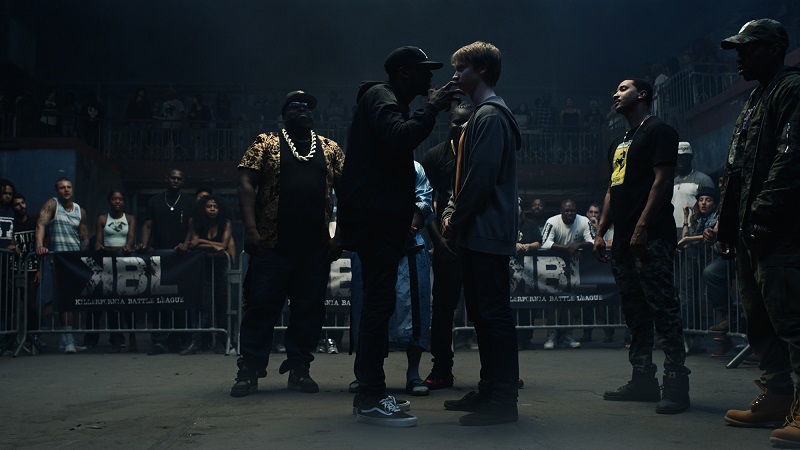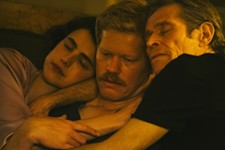The Right to be Offensive
Joseph Kahn on his new battle rap social satire Bodied
By Richard Whittaker, 10:30AM, Tue. Nov. 6, 2018
When America started amending the Constitution, the number one priority was freedom of speech. With that comes the right to say things that someone will find offensive. Joseph Kahn’s heavy-hitting satire Bodied finds that right being both abused and under fire.
If 8 Mile was a beginner’s introduction to battle rap – the art of facing off and freestyling the living, insulting shit out of each other – then Bodied is a master’s thesis. Produced by Eminem and self-financed by Kahn (“No one greenlit this but me,” he said, “[so] as far as I’m concerned, this is a home movie”), it follows nerdy academic Adam (Calum Worthy) as rapper Behn Grymm (Jackie Long) inducts him into the scene, where he soon starts to excel.
But this is no “rich kid from the right side of the tracks does good in the ghetto,” cultural appropriation movie. Bodied is a swing-for-the-fences home run of a social satire, using battle rap to take on taboos, academia, racism, language, woke culture, and even the inherent contradictions of battle rap itself. Kahn said, “There’s a scene in the movie where you have a bunch of white kids around a table, trying to be more woke than each other. But they’re actually, on a weird level, being kind of racist because they’re pontificating their perspective without actually having a dialogue. There’s not one black person at the table and they’re talking about black people as if they are talking with authority. Not engaging with another person and balkanizing yourself can actually make you more racist in a way that’s not foreseeable.”
Austin Chronicle: America is really mannered. In a lot of countries, you’re allowed to be mean to your friends, and that’s fine. Battle rap is one of the few places where it’s acceptable to say those worst things to your best friends.
Joseph Kahn: America was not always like that. To be fair to America, it is the leader in the world of a certain kind of human rights. It’s hard to imagine now with Trump in office, but America is a country that is built off slavery, and over the last 150 years it’s had a discourse. Release the slaves, give them freedom, give women rights, suffrage, the entire idea of immigrants coming here. We never say it anymore, but America is a melting pot, and that racial/cultural dialogue has been going on for a long time.
But now it’s got to the point where people are tribalized. It’s no longer a dialogue. It’s now that people are just carving out rules, and who’s setting these rules? People are hardening to a point where you’ve created these walls, and you can’t even talk about it anymore. Battle rap seems to be the last vestige of where people are allowed to go out and say whatever the fuck is on their mind. ’Cause if you look at where we are in American culture – and I think that it’s starting to happen worldwide, quite frankly – that offense culture has taken over. I don’t think it’s just here, but we’re always going to be a step ahead on it, and the rest of the world is getting a little bit of it too.
AC: At the moment America is very balkanized, but at the same time, for anyone looking in from outside, it’s more homogeneous than most Americans seem to realize.
JK: I will agree with you to some degree, but I do think there are huge differences within America. It is a fusion of different cultures, like Latino culture, or black culture that is really it’s own thing. If anything, one of the things that’s interesting – and I was discussing with Dizaster last night, who plays Megaton in the movie – black culture in America purposefully often shifts away. Every time white people come in and say, “We love black music, we love this,” there’ll be a leader in black culture who goes, “Fuck you, the culture’s now over here, and we’re going to change our words and we’re going to change our style, to always stay a little bit separate.”
London made a version of a battle rap movie (VS.), and battle rap is an American art form. I feel like the difference between working class white guys in London, in terms of what they’re arguing about, is far smaller than a white dude in America and a black dude in America. It’s not just a question of the income disparity. They literally come from two different cultures all together.
Jackie Long: You’ve got to really look at it as a sport. You see, not so long ago, the Conor McGregor fight. He [McGregor’s opponent, Khabib Nurmagomedov] lost, and the dude jumped over the cage. [McGregor had] already won the fight, but he wasn’t professional, and it started chaos. But this, it’s a place where you can express yourself, let out all your anger, talk about somebody, and then go have a drink with them at the end of the day – which is how it should be because you’re just talking about somebody. You’re trying to relieve your stress and be the champion.
I hear that every day from my black friends, who try to talk shit, even if it’s funny or not. My white friends who think they’re black sometimes. I have a lot of white friends who think they’re black, and I have a lot of black friends who think they’re white. So I don’t trip if somebody says, yeah, I know that white people shouldn’t say the word nigga because that’s what we’re taught. But I have white friends who say that word, and I look at them like, “Man, you crazy as fuck.” Because I know at the end of the day he’s not doing no harm to me. It’s just something that happens. So I don’t trip off that, especially when it’s a friend of mine.
Even though this dude [Calum Worthy] in the movie, we become friends and we have this theme where I always teach him, don’t talk about personals. Just don’t go there, because that’s how fights start. I show that I’m a real sports player. I take it serious, but I don’t take it that serious where you’re likely to punch this dude in his face.
Calum Worthy: It’s really a boxing match with words. What’s weird is that the audience reacts to it like someone got punched in the face, but there’s no violence in this movie except for one moment. It still feels like a violent movie, but it’s just because of the words.
For myself approaching this project, I know that we don’t need another movie about a white guy trying to make it in battle rap. That’s not what we need. … What the world does need is to talk about the topics that we talk about in Bodied, and bring up those questions.
AC: It’s the question of intention with language. It’s not always the word you say, but how you say it, and context. It’s like dueling: You can’t just wander up to somebody with a fencing sword and start going at them, but if you’re in 19th century Bavaria and agree to it, then it’s fine.
JK: That’s one of the big things we discuss in Bodied, that it’s the context of how you say these jokes. Because we live in a world today where we pretend these jokes don’t exist, and it’s actually bullshit. We know, deep down inside, everybody loves a race joke, or a sex joke, or a gender joke of some sort. But in today’s context, if you laugh at anything that has to do with sex or race, you’re either sexist or misogynist or a miscreant.
But we’re not perfect human beings. We’re trying to organize our thoughts in the least offensive way. We’re not walking monks, we’re human beings, and stereotypes, which are really the basis for a lot of these jokes, exist for a reason. The fact that a collective group of people can laugh at a stereotype means that there’s some sort of, not necessarily truth, but there’s a cultural validity to it at some level. And to be able to laugh at a stereotype within the right context can either be a celebration of it or a critique of it.
Bodied is in cinemas now. For review and showtimes, visit our listings page.
A note to readers: Bold and uncensored, The Austin Chronicle has been Austin’s independent news source for over 40 years, expressing the community’s political and environmental concerns and supporting its active cultural scene. Now more than ever, we need your support to continue supplying Austin with independent, free press. If real news is important to you, please consider making a donation of $5, $10 or whatever you can afford, to help keep our journalism on stands.
June 27, 2024
June 28, 2024
Bodied, Joseph Kahn, Calum Worthy, Jackie Long, Eminem, First Amendment, Battle Rap









